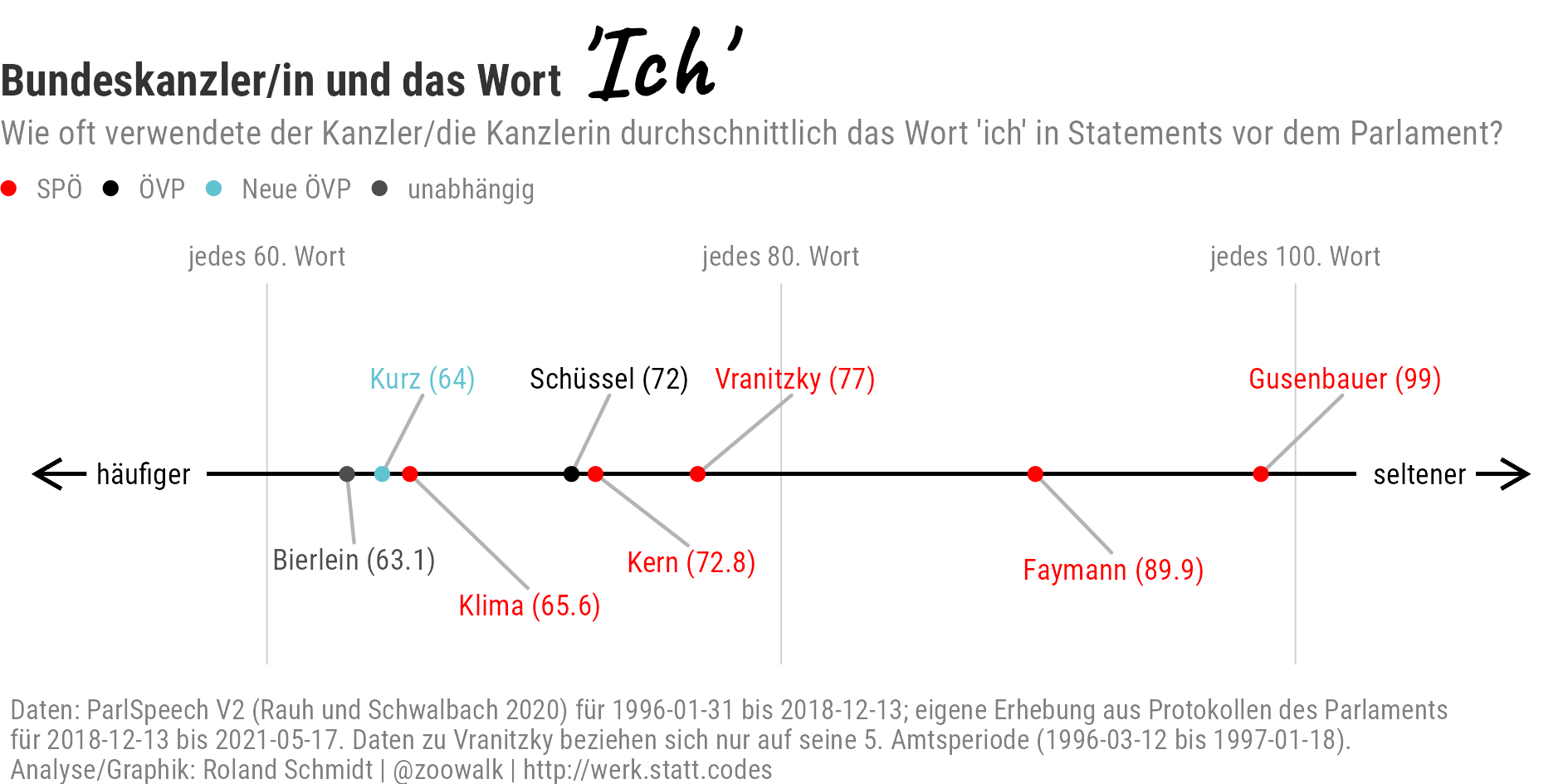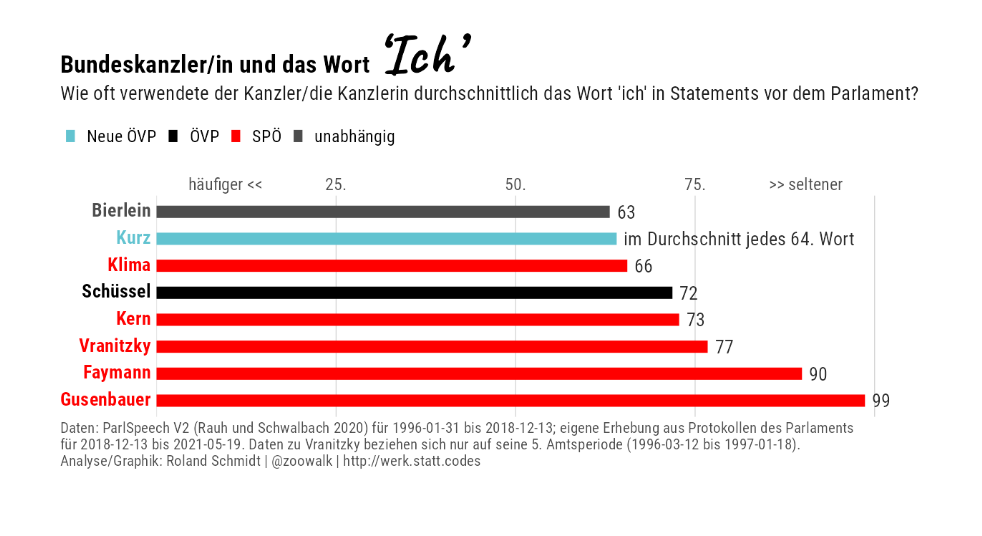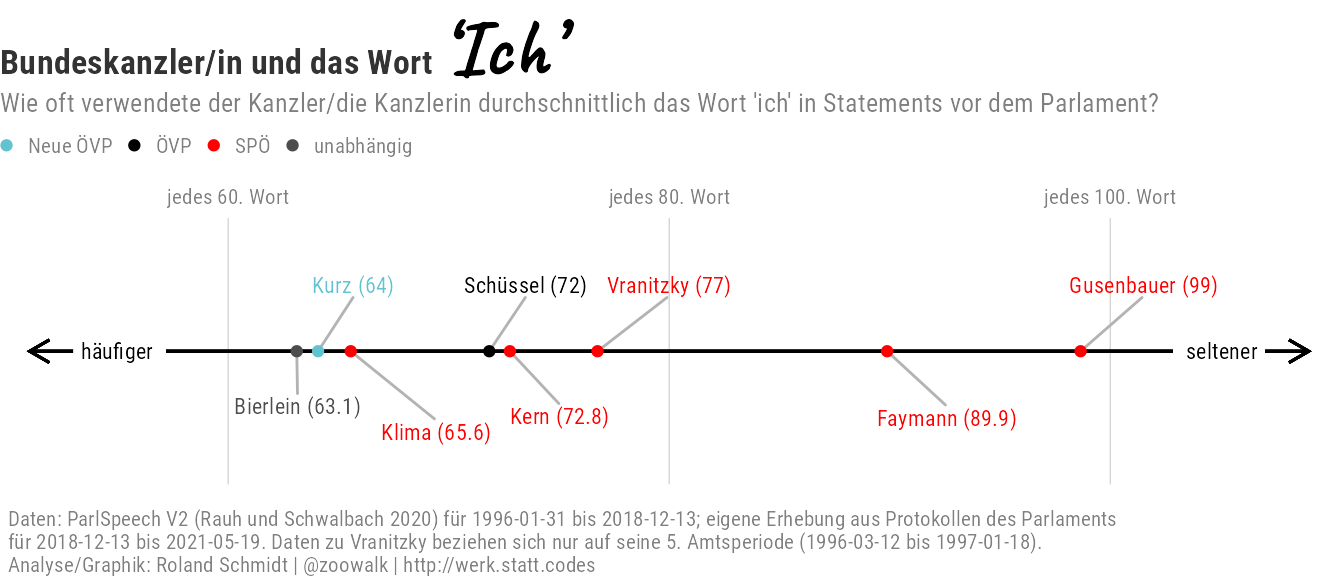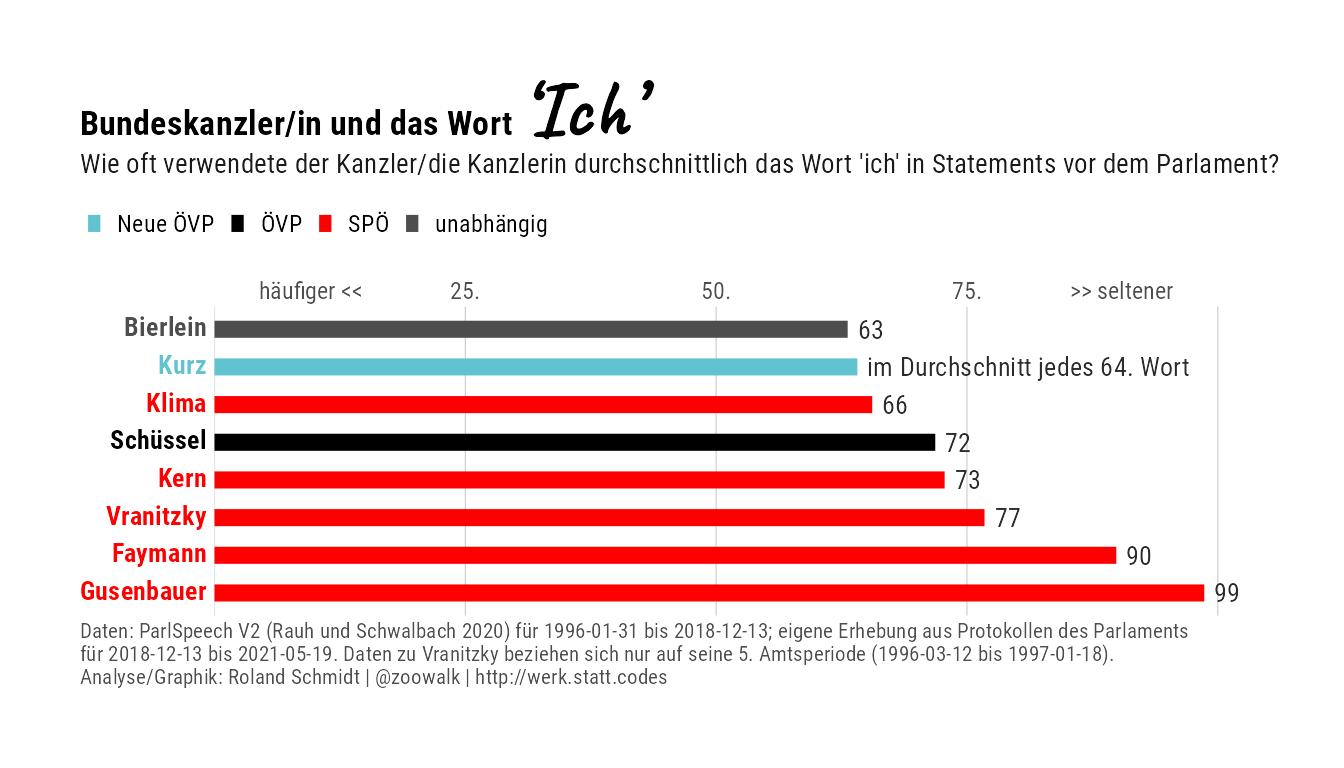ICH habe durchgesetzt, dass morgen Samstag ist. Und jetzt schönes WE, enk B. #ICHICHICH
— Matthias Strolz (@matstrolz) April 16, 2021
1 Just the results, please!
Plot version 1
Plot version 2
2 Context
This is another blog post which has populated my draft folder for much too long, and eventually got overtaken by reality. However, in light of the resignation of Austria’s Chancellor Sebastian Kurz, I felt compelled to finalize it.
The former chancellor is, so it is said, a man of many talents. Among them, and one in which he undoubtedly excels, is the ability to present himself in the most favorable light, catch the limelight, and take credit for positive developments (whether the latter are indeed always of his own making is another story). Within this context, former Neos boss Matthias Strolz posted a few months ago with tongue in cheek a tweet announcing that he had successfully enforced on a Friday that the weekend will start on the next day. Hashtag I, I, I (“Ich, Ich, Ich”).
This jokingly phrased tweet with its hashtag made me wonder whether there is actually any empirical evidence for Kurz using the word “I” (ich) more often than others. Around the same time as Strolz’ tweet, I (!) coincidentally stumbled across a relatively new dataset by Christian Rau and Jan Schwalbach [@Rauh.2020]. The very impressive ParlSpeech V2 dataset comprises the transcripts of parliamentary speeches of nine states, including Austria. In short, a wonderful source to check for Kurz’s use of the word ‘I’ and contrast it with that of his peers, i.e. previous chancellors.1
Unfortunately though, there’s a catch. For Austria, the ParlSpeech dataset only covers statements made between 15 Jan 1996 and 13 Dec 2018. Consequently, it excludes chancellors prior to Franz Vranitzky, and also only covers a part of the latter’s time in office. Furthermore, and more problematic, the dataset also does not cover the later part of Kurz’s first government (18 Dec 2017 - 28 May 2019) and Kurz’s latest (last?) government (7 Jan 2020 - 11 October 2021).
In order to overcome the latter shortcoming, I digged into the transcripts as provided on the website of Austria’s parliament and extracted all statements given in Parliament, including those of Kurz. While one may rightfully wonder whether the frequency of the word “I” has actually any instrumental, epistemological value, let alone taking it as an indicator for a personality feature, the work to extract all statements was too arduous to simply leave it unused. The instructions on how to extract the statements from Parliament’s transcripts I detailed in this previous post.
| Speeches by chancellors covered by the ParlSpeech dataset and own data | ||||
To eventually obtain a consolidated dataset which also includes Kurz’s statements up to his last day in office and be able to check for the presence of the word “I” the following steps were required:
Get data
- Load data from [@Rauh.2020] and keep only statements by chancellors
- Extract text from transcripts for missing periods and keep only statements by chancellors (Kurz, Bierlein)
- Combine both datasets and avoid overlaps/duplications
- Complement data with additional details for further analysis (number of words, time in office)
Analysis
- Get frequency of word “I”
- Control for total number of words spoken and/or time in office (relative frequency).
- Compare and plot
Below the pertaining code with some comments added inline.
3 Getting the data
3.1 Import ParlSpeech datset
First, let’s get the data contained in the ParlSpeech V2 dataset, which is on Harvard’s dataverse here. As you’ll see, there is a file for each of the nine parliaments. Corp_Nationalrat_V2.rds is the file on Austria we are looking for. The code chunk below makes use of the dataverse package which enables you to directly import files from Harvard’s dataverse.
Let’s only keep the statements by chancellors, and extract their family name.
Code
df_parlspeech_chancellor <- df_parlspeech %>%
filter(str_detect(speaker, regex("^Bundeskanzler(in)?\\b"))) %>%
mutate(name_family=str_extract(speaker, regex("\\w+$")))Here the first (truncated) statement of every chancellor contained in the ParlSpeech dataset.
Before combining the data obtained from the ParlSpeech dataset, we’ve to make sure that there is no overlap in terms of time covered by the two datasets (what would result in duplicates). With a view to ensure this, I’ll take the latest date in the ParlSpeech dataset as a cut-off date. Any observation contained in the data retrieved by me which precedes this cut-off date will be excluded.
Code
date_cut_off_max <- max(df_parlspeech_chancellor$date)
date_cut_off_max[1] "2018-12-13"Furthermore, let’s check the starting date of the ParlSpeech data.
Code
date_cut_off_min <- min(df_parlspeech_chancellor$date)
date_cut_off_min[1] "1996-01-31"A look at chancellors’ time in office reveals that the starting date of covered statements is at the end of Vranitzky’s fourth term. Consequently, I only keep his fifth term, for which data on all statements is available. The data on chancellors’ time in office is retrieved from a repository which I had previously created, and based on data published on the parliament’s website.
Code
#keep data only for Vranitzky's 5th term
df_parlspeech_chancellor <- df_parlspeech_chancellor %>%
filter(date >= as.Date("1996-03-12"))3.2 Add data extracted from transcripts
Now let’s add those statements which were given after the end of ParlSpeech’s coverage (2018-12-13). These statements were previously extracted here and are available for download here.
To directly import the dataset from data.world, where I stored it, I’ll use data.world package.
3.3 Combine
Keep only statements by chancellors made after the end of ParlSpeech’s coverage.
Code
df_additions <- df_XXVI_XXVII %>%
select(date=date_first, speaker, text=statement, office_position) %>%
#remove statements preceding ParlSpeech's end date
filter(date > date_cut_off_max) %>%
#keep only statements by chancellors
filter(str_detect(office_position, regex("Bundeskanzler(in)?\\b")))Combine both datasets.
Code
df_all <- bind_rows(df_parlspeech_chancellor, df_additions) %>%
as_tibble() %>%
mutate(speaker_name_family=str_extract(speaker, regex("\\S*$"))) %>%
mutate(text_length=str_count(text, regex("\\w+"))) #Add details on chancellors’ terms to the data:
Add details on party affiliation:
Code
vec_color <- c("SPÖ"="red", "ÖVP"="black", "Neue ÖVP"="#62C3D0", "unabhängig"="grey30")
df_party<- tibble::tribble(
~name, ~party,
"Vranitzky", "SPÖ",
"Klima", "SPÖ",
"Kurz", "Neue ÖVP",
"Schüssel", "ÖVP",
"Bierlein", "unabhängig",
"Gusenbauer", "SPÖ",
"Faymann", "SPÖ",
"Kern", "SPÖ"
)
df_chancellors_speeches <- df_chancellors_speeches %>%
left_join(.,
df_party,
by=c("chancellor_name_family"="name"))4 Results
4.1 Some exploratory snapshots:
4.1.1 Number of days with at least one statement by a chancellor
4.1.2 Total number of words spoken by a chancellor
Anzahl der gesprochenen Worte im Parlament pro Tag im Amt
Daten ab Vranitzky 5 (März 1996).
Daten: ParlSpeech V2 (Rauh und Schwalbach 2020) für 1996-01-31 bis 2018-12-13; eigene Erhebung aus Protokollen des Parlaments für 2018-12-13 bis 2021-05-19. Daten zu Vranitzky beziehen sich nur auf seine 5. Amtsperiode (1996-03-12 bis 1997-01-18). Analyse/Graphik: Roland Schmidt | @zoowalk | http://werk.statt.codes
A few things stood out for me here: First, Chancellor Schüssel, who is occasionally remembered as the “Chancellor of Silence” (“Schweigekanzler”) was actually quite talkative. In absolute numbers, no other chancellor in the dataset spoke more than Schüssel during his second term. And also his relative numbers are among the top figures. Admittedly, his nickname did not refer to the length of his statements, but rather - if I remember correctly - the (alleged) absence of statements when it came to controversial issues, i.e. statements by his extreme-right coalition partner.
Second, and more related to my point of departure, chancellor Kurz features very low numbers. With the exception of the special case of chancellor Bierlein (caretaker/expert government) no other chancellor had fewer words spoken in parliament, if take the duration of his office into account.
4.2 Use of term “I”
Now let’s focus on the chancellors’ usage of the word ‘I’ (‘ich’). Below the code and comments.
For the sake of clarity, but mainly due to an inability to make up my mind, two plots which depict the same data. Again, with the exception of the special case of Bierlein, no other chancellor used the word ‘I’ more often than Kurz (however, the difference to Klima seems not considerable).
4.2.1 Plot version 1
4.2.2 Plot version 2
5 Wrap-up
So that’s it. If the above results are not profoundly meaningful (or maybe they are?), I found them at least somewhat entertaining. As always, if you spot any error, have a question etc. feel free to contact me, best via twitter direct message.
Footnotes
Obviously, a chancellor’s speeches in Parliament are only one part of his/her overall corpus of statements. It could be that answers in Parliament are formulated differently than those outside when it comes to the use of the word ‘I’.↩︎
Reuse
Citation
@online{schmidt2021,
author = {Schmidt, Roland},
title = {How Often Do {Austria’s} {Chancellors} Use the Word “{I}”},
date = {2021-11-21},
url = {https://werk.statt.codes/posts/2021-04-22-how-often-do-austrias-chancellors-use-the-word-i},
langid = {en}
}





